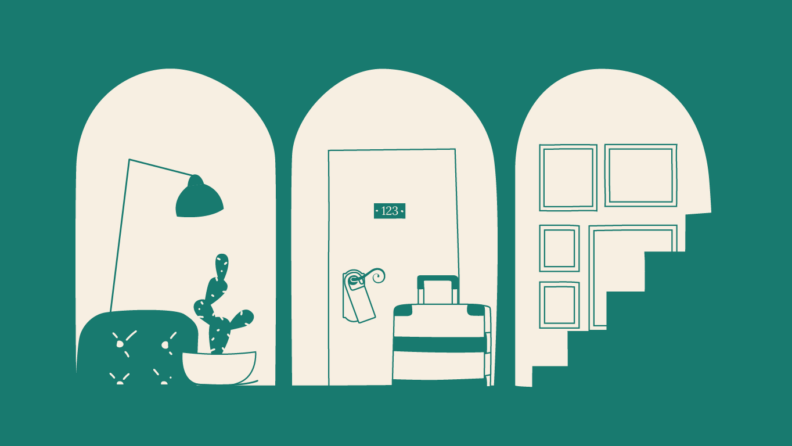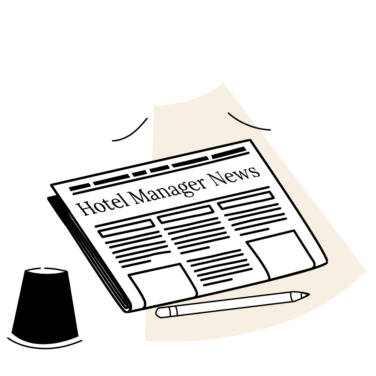Managing a hotel can feel overwhelming, with daily challenges like guest satisfaction, staff coordination, and staying ahead of industry trends. I understand how demanding it can be to balance these tasks while maintaining profitability. With years of experience in hotel management, I’ve gained insight into what works and what doesn’t.
This complete guide will walk you through all aspects of hotel management, from operations to marketing, and help you leverage software to streamline your processes, save time, and enhance guest experiences.
Hotel Management Overview
Hotel management is all about running the daily operations of a hotel, ensuring guests have a great stay and various hotel staff roles are at the top of their game. It covers a wide range of responsibilities, from staffing to finances.
What is the Hotel Industry?
The hotel industry provides lodging and accommodations for travelers. It includes a wide range of services, from budget-friendly motels to luxury hotels, serving business and leisure travelers. Hotels can also offer amenities like restaurants, conference rooms, and spas, which attract guests for different reasons.
What is Hotel Management?
Hotel management is the process of overseeing all operations of a hotel. This includes managing staff, ensuring guest satisfaction, and maintaining the hotel's financial health. Building strong hotel manager skills is essential for leading a successful property and ensuring guest satisfaction. The goal is to provide smooth operations that create a positive guest experience while maximizing profitability.
Hospitality Management vs. Hotel Management?
Hospitality management is a broader field that covers many sectors like restaurants, travel, and tourism. Hotel management is more focused on the specific needs of running a hotel. While both involve customer service and operations, hotel management deals with areas like housekeeping, front desk, and reservations specific to lodging.
A Brief History of the Hotel Management Profession
Hotel management as a profession began with the rise of organized travel and tourism in the 19th century. As hotels became more sophisticated, the need for professional management grew. Over time, hotel managers evolved from caretakers to highly skilled professionals overseeing complex operations, leading to the specialized career paths available today.
Hotel Managers' salary can be upward of $60K, though additional hospitality certification can increase that substantially.
Hotel Operations: The Day-to-Day
Hotel operations refer to everything that keeps the hotel running smoothly, like housekeeping, front desk services, maintenance, and hotel management tricks that make every stay unique and special. These tasks are essential for delivering a seamless guest experience.
What are Hotel Operations?
Hotel operations cover the daily management of all services and facilities within a hotel. Here's a breakdown of the typical tasks:
Daily Tasks
- Managing guest check-ins and check-outs
- Housekeeping duties to maintain cleanliness
- Ensuring guest satisfaction through customer service
- Monitoring reservations and availability
Weekly Tasks
- Inventory checks for supplies
- Staff scheduling and shifts adjustment
- Reviewing guest feedback for improvements
Monthly Tasks
- Financial performance analysis and reporting
- Deep cleaning or maintenance of facilities
- Training staff for service improvements
Yearly Tasks
- Budget planning and goal setting
- Major renovations or upgrades
- Annual employee performance reviews and bonuses
Hotel Departments & What they Do
Each hotel department plays a specific role in maintaining daily operations, working together to create a seamless experience for guests while keeping the hotel running smoothly.
Management & Finance Department
This department oversees the hotel's overall operations and finances. It handles budgeting, payroll, and financial reporting to ensure profitability. Effective management ensures the hotel runs smoothly and that all departments work together efficiently under the guidance of a skilled hotel operations manager.
Food & Beverage Hotel Department
This department manages the hotel’s dining services, including restaurants, bars, and room service. It ensures food quality, customer satisfaction, and revenue generation through food and beverage sales.
Front Office Hotel Department
The front office is the first point of contact for guests. It handles check-ins, check-outs, reservations, and guest inquiries. This department plays a key role in providing a welcoming and seamless guest experience.
Housekeeping Hotel Department
Housekeeping is responsible for cleaning and maintaining guest rooms and common areas. Their work ensures the hotel is clean, comfortable, and up to the standards guests expect.
Maintenance Hotel Department
The maintenance department handles the upkeep of the hotel’s physical infrastructure, including plumbing, electrical systems, and repairs. They ensure that everything is functioning properly to avoid disruptions to guest services.
Reservations & Marketing Hotel Department
This department handles booking management and promotes the hotel through various marketing efforts. They drive occupancy rates and work to attract new guests through advertising, promotions, and partnerships.
Human Resource Hotel Department
The human resource department manages recruitment, training, and employee relations. It ensures that the hotel has well-trained staff to provide excellent service and maintain a positive work environment.
Marketing and Revenue Management for Hotels
Marketing and revenue management focus on promoting the hotel and maximizing profits. This includes pricing strategies, advertising, and working to increase bookings.
Hotel Marketing Strategies
Hotel marketing strategies focus on promoting a hotel’s brand and services to attract and retain guests. Successful strategies often include online advertising, social media engagement, email marketing, and loyalty programs.
Each of these tactics helps hotels connect with potential guests and build a lasting relationship with returning customers. For instance, hotels can use targeted ads on search engines and social media platforms to attract specific demographics, such as business travelers or vacationing families.
Another key strategy is leveraging a hotel’s unique selling points (USPs), such as its location, amenities, or eco-friendly practices, to differentiate from competitors. Hotels can also partner with travel influencers or use user-generated content to build trust and visibility.
Email marketing remains a powerful tool for sharing special offers and updates with past guests, while search engine optimization (SEO) helps hotels rank higher in search results, ensuring visibility to potential customers during their booking journey.
Hotel Marketing Trends for 2025
If you've tried and succeeded at (or learned from) any current hotel marketing trends, be sure to find a way to include your expertise in any hotel management interview questioning. This will show that you are paying attention to the industry and aren't afraid to take calculated risks.
- Personalization: Using guest data and AI to tailor offers and enhance guest experiences.
- Sustainability: Promoting eco-friendly practices to attract environmentally conscious travelers.
- Video Content: Engaging potential guests with virtual tours and behind-the-scenes footage on social media.
Hotel Revenue Management
Hotel revenue management involves optimizing pricing and inventory to maximize a hotel’s profitability. This practice ensures that rooms are sold at the right price to the right customer, at the right time. Revenue managers analyze various factors like demand forecasts, booking patterns, and hotel market trends to make informed pricing decisions.
Key components include dynamic pricing, overbooking strategies, and demand-based room allocation. The goal is to achieve the highest possible revenue per available room (RevPAR), a crucial metric for measuring financial performance.
To succeed, hotels must also consider their distribution channels, such as direct bookings, online travel agencies (OTAs), and third-party platforms. One of my best pro hotel management tips: Balancing these three channels with care ensures that hotels reach a broad audience while minimizing commission fees.
Effective revenue management requires continuous monitoring of their hotel management metrics as well as comparison to industry benchmarking.
Hotel Revenue Management Trends for 2025
- AI & Analytics: Advanced tools for real-time pricing and precise demand forecasting.
- Total Revenue Management (TRM): Maximizing profits from all revenue sources, not just room bookings.
- Guest Lifetime Value (GLV): Shifting focus to long-term, high-value customer strategies.
Human Resources: Tips for the Hospitality Industry
Human resources in hotels handle recruiting, training, and managing employees. It ensures that the staff is well-prepared and motivated to deliver top-notch service.
Staffing and Human Resources in Hotel Management
Staffing and human resources in hotel management focus on finding the right people and creating a productive work environment. HR manages recruitment, employee training, and staff development, ensuring the hotel team is well-prepared to meet guest expectations. Human resources also handle employee relations, benefits, and compliance with labor laws.
Recruitment and Training
Recruiting the right staff is crucial for a hotel’s success. Hotels need to hire employees who can deliver excellent customer service and maintain hotel standards. Proper training ensures that staff are equipped with the skills to perform their duties efficiently and consistently.
Employee Retention Strategies
Keeping good employees is essential for smooth hotel operations. Offering competitive pay, growth opportunities, and a positive work environment helps retain staff. Recognizing and rewarding employees for their hard work also improves job satisfaction and loyalty, reducing turnover rates.
Addressing Diversity and Inclusion
Diversity and inclusion in the workplace are important for fostering a welcoming environment for both employees and guests. Hotels benefit from diverse perspectives and skills, which enhance problem-solving and service delivery. Implementing policies that promote inclusion and equal opportunities helps build a supportive and fair workplace culture
How to Work in Hospitality: Education & Career
A career in hotel management usually starts with a specialized degree and offers opportunities in various departments. This field allows for hospitality management career growth and leadership roles within the hospitality industry.
Which Degree Do You Need for Hotel Management?
A degree in hotel management, hospitality, or business administration is ideal for a career in hotel management. There are plenty of hotel management courses to get you started or help you upskill and land that promotion. These programs cover essential topics like operations, finance, marketing, and human resources, preparing graduates for leadership roles in the hospitality industry.
What Kind of Jobs Can You Get With a Hotel Management Degree?
With a hotel management degree, you can pursue various roles: become a hotel manager, front office supervisor, food and beverage director, or event coordinator. This degree opens up opportunities across different departments within the hospitality industry.
Job Boards: Find Your Ideal Hotel Job
Job boards like HCareers, Hospitality Online, and Indeed offer a wide range of listings for hotel management positions. These platforms allow you to filter jobs by location, experience level, and department to find the best fit for your skills.
Channels for Finding Hotel Management Jobs Online
In addition to job boards, LinkedIn and company career pages are valuable channels for finding hotel management jobs. Networking within hospitality groups on social media can also help you discover hidden opportunities or connect directly with employers.
Hotel Management Technology & Trends
Technology is shaping the hotel industry with new tools like automation and smart rooms. Staying updated with the latest trends helps hotels remain competitive and efficient.
Tech Trends in the Hotel Industry
Technology is rapidly transforming the hotel industry, making operations more efficient and enhancing the guest experience. Innovations like automation, mobile apps, and smart room technology are gaining popularity among hotels worldwide. These trends are not just about convenience but also about improving guest satisfaction and streamlining internal processes.
- Automation: Self-check-ins, smart keys, and room controls via mobile apps.
- AI Chatbots: Handling guest inquiries and bookings, reducing wait times.
- Smart Rooms: Personalized experiences through voice assistants, lighting, and temperature control.
Consumer Trends in the Hotel Industry
Consumer preferences are evolving, with guests now seeking more personalized, sustainable, and technology-driven experiences. Travelers are placing more value on eco-friendly practices, seamless digital services, and unique stays that offer more than just a room. Hotels that can adapt to these changing trends are better positioned to attract and retain customers.
- Personalization: Tailored services and experiences based on guest preferences.
- Sustainability: Environmentally friendly practices like energy-efficient systems and waste reduction.
- Unique Stays: Guests preferring boutique hotels or properties with distinct local character.
Important Hotel Software Solutions
Hotel software solution features can streamline operations, enhance guest experiences, and improve revenue management. Choosing the right software can improve efficiency, boost bookings, and help manage multiple hotel functions.
- Hotel management software: Centralized control of reservations, housekeeping, and billing.
- Online Booking Tools: Allows direct bookings from the hotel’s website and OTAs.
- Revenue Management Software: Optimizes pricing and maximizes profits based on market demand.
- Hotel CRM Tools: Track guest preferences and enhance personalized services.
- Property Management Systems (PMS): Streamlines reservations, billing, and operations for efficiency and personalization.
Hotel Management FAQ
In this Hotel Management FAQ section, we'll address common questions about key roles, operations, strategies, and the evolving trends within the hospitality industry, offering clear and concise insights for both professionals and newcomers.
Can I Outsource My Hotel Management?
Sure, experts can manage your hotel if you are unable to. Outsourcing to a hotel management company lets you pass the responsibility to professionals who understand how to optimize operations, reduce costs, and increase revenue, giving you peace of mind.
What are the key roles in hotel management?
Key roles in hotel management include the general manager, who oversees all operations, and the front office manager, responsible for guest check-ins and handling issues. The concierge plays an important role in guest satisfaction, assisting with reservations, directions, and recommendations. Each of these roles ensures that the hotel operates smoothly and that guests have a great experience from start to finish.
How do hotels ensure strong business and strategy practices?
A successful hotel relies on a solid management strategy and focuses on the bottom line by maximizing revenue while controlling costs. Effective revenue management strategies ensure that pricing adapts to demand. Operations management is key to overseeing day-to-day operations and keeping the hotel running smoothly, ensuring guest satisfaction and overall success.
How do hotels manage their staff and training?
Effective staff training is essential for smooth hotel operations, as well-trained staff members deliver better service. Strong leadership skills and management skills are necessary to manage teams efficiently, while staff management ensures that employees are motivated and supported. A well-trained staff contributes significantly to the hotel's overall success.
What defines a great guest experience at a hotel?
Exceptional service is the foundation of a great guest experience. Ensuring that hotel guests feel welcome and comfortable in their hotel room is key to creating positive memories. Keeping an eye on online reviews helps hotels understand what guests appreciate and what needs improvement, allowing them to continuously enhance their service quality.
How do hotels handle their day-to-day operations?
There are different types of hotel management tools that help organize everything from daily tasks to housekeeping to bookings to marketing/sales efforts.
Effective hotel operations involve managing the hotel business to ensure smooth functioning, from housekeeping to front desk services. Ensuring operational efficiency helps streamline processes and save costs. Managing restaurant and beverage services ensures that guests have a well-rounded experience during their stay.
What are some key industry terms in hotel management?
Key industry terms include hoteliers, who are professionals involved in managing or owning hotels. Hotel chains refer to groups of hotels under the same brand, offering consistent experiences across locations. Monitoring hotel performance ensures that the property is meeting financial goals and maintaining high service standards.
What software do small hotels use?
PMS for small hotels is software that helps small hotels handle everything from booking rooms to managing payments and housekeeping. It's a simple way to keep track of everything that happens at the hotel, ensuring guests are taken care of and the hotel runs smoothly without a lot of effort.
Conclusion
Hotel management is one of the most important and challenging careers in the hospitality industry. It requires a wide range of skills and a lot of coordination between different team members. But it can also be very rewarding, knowing that you are responsible for creating a positive experience for guests from start to finish.
Don't forget to browse around the site for more great hotel management tips, templates, and tools. Plus, join The Hotel GM newsletter for expert tidbits sent right to your inbox!



